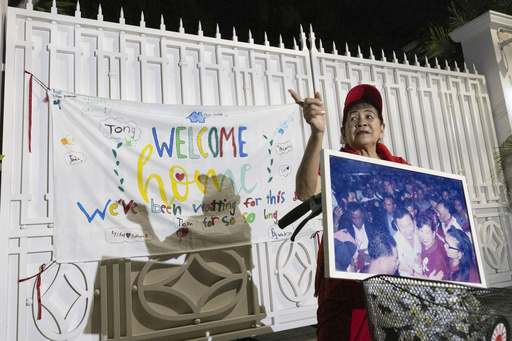BANGKOK (AP) — Thailand’s former Prime Minister Thaksin Shinawatra, the Southeast Asian nation’s most controversial politician for more than two decades, was released on parole early Sunday from a Bangkok hospital where he spent six months serving time for corruption-related offenses.
The telecoms billionaire was toppled in a 2006 coup but voluntarily returned from self-exile to Thailand in August last year and reported to prison to begin serving an eight-year sentence. Critics charged that the 74-year-old Thaksin’s early release reeked of a deal that short-circuited justice for political reasons.
Current Prime Minister Srettha Thavisin, a leading member of the ruling Thaksin-backed Pheu Thai party, expressed congratulations to his predecessor.
Thaksin was seen wearing a neck brace, a sling on his right arm and a surgical mask inside one of the cars in a convoy that left the Police General Hospital just before sunrise. He was accompanied by his two daughters on his way to his residence in western Bangkok.
“Thaksin is still believed to wield huge influence, and will still maneuver for sure, he will conduct the music behind the scenes,” Thitinan Pongsudhirak, a political science professor at Bangkok’s Chulalongkorn University, said. “But Pheu Thai has less power than they used to and we’ll have to see how he does it.”
After his return from exile, Thaksin was moved almost immediately to the hospital on grounds of ill health and about a week later, King Maha Vajiralongkorn reduced his sentence to a single year.
The former leader had won unprecedented electoral support but also influential enemies among Thailand’s traditional royalist ruling class during his time in office in 2001-2006.
He was accused of corruption and abuse of power as well as disrespect for the monarchy when the military removed him from power in 2006. Thailand’s conservative elite, including the army, regarded his popularity and brash populist politics as a threat to the royal institution, which they see as a linchpin of Thai society.
Even after his ouster, Thaksin’s supporters and opponents had continued their struggle for power with violent street fighting, election battles, confrontations in the courts and another coup in 2014 that ousted a government that had been formed by Thaksin’s sister.
Last year’s elections brought change when the progressive Move Forward party unexpectedly finished first, the first time since 2001 that a Thaksin-backed party failed to top the polls. Move Forward’s proposals for reforms to the monarchy and the military resonated with large numbers of younger voters, weary of the army-backed governments that had held power since a 2014 coup.
Move Forward was stymied when the military-appointed Senate refused to approve its candidate for prime minister, paving the way for Pheu Thai to form a coalition government including parties linked with the military. Pheu Thai also softened its longstanding anti-military line and reform proposals it promised during the election campaign.
Critics charged the deal included a soft landing for Thaksin upon his return last year.
“In one sense, Thaksin going home to his family is an end to a personal and political journey that began with the 2006 coup when Thailand’s most popular prime minister was ousted,” Kevin Hewison, a professor emeritus at the University of North Carolina and a veteran Thai studies scholar, told The Associated Press.
He said the deal to bring him home and allow his Pheu Thai Party to lead a coalition government with military-backed parties “shows how the progressive politics of Thailand’s younger generation and the electorally successful Move Forward Party have left Thaksin and Pheu Thai behind.”
Move Forward, which now leads the parliamentary opposition, issued a statement Sunday reflecting widespread suspicion that Thaksin had received a sweetheart deal because of the political influence he can still wield. The circumstances raised questions over whether he benefited from double standards in the justice system, it said.
At the same time it acknowledged that Thaksin’s ouster was unfair and undemocratic. Thaksin has insisted that his prosecution in the courts was politically motivated.
Thaksin will still have to report to parole officers every month for the remainder of his sentence and will have a travel restriction, but he is not required to wear an ankle monitor due to his age and health conditions, officials have said.
He is not yet clear of all legal challenges. Thai officials said earlier this month that they have reopened an investigation into allegations of defaming the monarchy made against Thaksin almost nine years ago. If the Office of the Attorney General decides to indict him, Thaksin could be detained again.
His youngest daughter Paetongtarn Shinawatra, who recently became Pheu Thai party chief, on Sunday afternoon posted a photo on her Instagram account of Thaksin sitting in shorts by a swimming pool, still wearing a neck brace and a sling on his arm.
“After not breathing air and seeing the sun on the outside for 180 days, and not being back to this house for 17 years … Dad came to sit outside like this. He sat there for quite some time. #finallyhome? she wrote, adding a heart emoji at the end.
___
Associated Press writer Grant Peck contributed to this report.
___
Follow AP’s Asia-Pacific coverage at https://apnews.com/hub/asia-pacific
